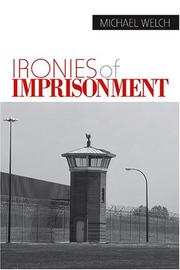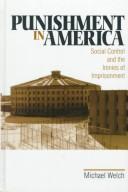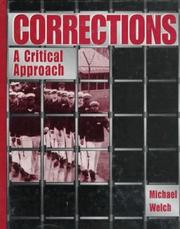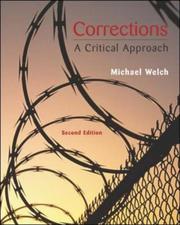| Listing 1 - 10 of 25 | << page >> |
Sort by
|

ISBN: 0761930590 1412904803 1322283265 1452222223 1452237395 9781452237398 9781322283265 9781412904803 9781452222226 Year: 2005 Publisher: Thousand Oaks, CA : Sage Publications,
Abstract | Keywords | Export | Availability | Bookmark
 Loading...
Loading...Choose an application
- Reference Manager
- EndNote
- RefWorks (Direct export to RefWorks)
'Ironies of Imprisonment' examines an array of problems confronting correctional programmes & policies. Michael Welch challenges the prevailing logic of mass incarceration & traces the ironies of imprisonment to their root causes, manifesting in social, political, economic & racial inequality.
Imprisonment --- Prisons --- Corrections --- Criminal justice, Administration of --- Emprisonnement --- Services correctionnels --- Justice pénale --- Administration --- Justice pénale --- Correctional services --- Penology

ISBN: 0761910840 Year: 1999 Publisher: Thousand Oaks (Calif.) : Sage,
Abstract | Keywords | Export | Availability | Bookmark
 Loading...
Loading...Choose an application
- Reference Manager
- EndNote
- RefWorks (Direct export to RefWorks)
Criminal justice, Administration of --- Imprisonment --- Prisons --- Punishment --- Social control
Book
ISBN: 9786612033551 1282033557 0813546508 9780813546506 9781282033559 9780813544342 0813544343 9780813544359 0813544351 661203355X Year: 2009 Publisher: New Brunswick, N.J. : Rutgers University Press,
Abstract | Keywords | Export | Availability | Bookmark
 Loading...
Loading...Choose an application
- Reference Manager
- EndNote
- RefWorks (Direct export to RefWorks)
Since 9/11, a new configuration of power situated at the core of the executive branch of the U.S. government has taken hold. In Crimes of Power & States of Impunity, Michael Welch takes a close look at the key historical, political, and economic forces shaping the country's response to terror. Welch continues the work he began in Scapegoats of September 11th and argues that current U.S. policies, many enacted after the attacks, undermine basic human rights and violate domestic and international law. He recounts these offenses and analyzes the system that sanctions them, offering fresh insight into the complex relationship between power and state crime. Welch critically examines the unlawful enemy combatant designation, Guantanamo Bay, recent torture cases, and collateral damage relating to the war in Iraq. This book transcends important legal arguments as Welch strives for a broader sociological interpretation of what transpired early this century, analyzing the abuses of power that jeopardize our safety and security.
Subversive activities --- Intelligence service --- National security --- Terrorism --- Homeland defense --- Homeland security --- Government policy --- United States

ISBN: 1281151343 9786611151348 0813541395 9780813541396 6611151346 0813538955 9780813538952 0813538963 9780813538969 9781281151346 0813538955 9780813538952 Year: 2006 Publisher: New Brunswick, N.J. : Rutgers University Press,
Abstract | Keywords | Export | Availability | Bookmark
 Loading...
Loading...Choose an application
- Reference Manager
- EndNote
- RefWorks (Direct export to RefWorks)
From its largest cities to deep within its heartland, from its heavily trafficked airways to its meandering country byways, America has become a nation racked by anxiety about terrorism and national security. In response to the fears prompted by the tragedy of September 11th, the country has changed in countless ways. Airline security has tightened, mail service is closely examined, and restrictions on civil liberties are more readily imposed by the government and accepted by a wary public. The altered American landscape, however, includes more than security measures and ID cards. The country's desperate quest for security is visible in many less obvious, yet more insidious ways. In Scapegoats of September 11th, criminologist Michael Welch argues that the "war on terror" is a political charade that delivers illusory comfort, stokes fear, and produces scapegoats used as emotional relief. Regrettably, much of the outrage that resulted from 9/11 has been targeted at those not involved in the attacks on the Pentagon or the Twin Towers. As this book explains, those people have become the scapegoats of September 11th. Welch takes on the uneasy task of sorting out the various manifestations of displaced aggression, most notably the hate crimes and state crimes that have become embarrassing hallmarks both at home and abroad. Drawing on topics such as ethnic profiling, the Abu Ghraib scandal, Guantanamo Bay, and the controversial Patriot Act, Welch looks at the significance of knowledge, language, and emotion in a post-9/11 world. In the face of popular and political cheerleading in the war on terror, this book presents a careful and sober assessment, reminding us that sound counterterrorism policies must rise above, rather than participate in, the propagation of bigotry and victimization.
Civil rights --- Prejudices --- Islamophobia --- Arab Americans --- State crimes --- Hate crimes --- September 11 Terrorist Attacks, 2001 --- War on Terrorism, 2001-2009 --- Crimes committed by states --- State-sponsored crimes --- Crime --- Anti-Islam prejudice --- Anti-Islamism --- Anti-Muslim prejudice --- Anti-Muslimism --- Discrimination against Muslims --- Ethnic relations --- Arabs --- Ethnology --- Crimes against --- Influence. --- Moral and ethical aspects. --- United States --- Race relations. --- Race question --- Moral and ethical aspects --- September 11 terrorist attacks, 2001 --- Influence --- Préjugés --- Race relations
Book
ISBN: 9780520961500 0520961501 9780520286153 0520286154 9780520286160 0520286162 Year: 2015 Publisher: Berkeley, CA : University of California Press,
Abstract | Keywords | Export | Availability | Bookmark
 Loading...
Loading...Choose an application
- Reference Manager
- EndNote
- RefWorks (Direct export to RefWorks)
The resurrection of former prisons as museums has caught the attention of tourists along with scholars interested in studying what is known as dark tourism. Unsurprisingly, due to their grim subject matter, prison museums tend to invert the "Disneyland" experience, becoming the antithesis of "the happiest place on earth." In Escape to Prison, the culmination of years of international research, noted criminologist Michael Welch explores ten prison museums on six continents, examining the complex interplay between culture and punishment. From Alcatraz to the Argentine Penitentiary, museums constructed on the former locations of surveillance, torture, colonial control, and even rehabilitation tell unique tales about the economic, political, religious, and scientific roots of each site's historical relationship to punishment.
Prisons --- Dark tourism. --- Correctional institutions --- Historical museums. --- History --- History museums --- Museums --- Corrections institutions --- Penal institutions --- Corrections --- Public institutions --- Black tourism (Dark tourism) --- Grief tourism --- Thanatourism --- Tourism --- Dungeons --- Gaols --- Penitentiaries --- Imprisonment --- Prison-industrial complex --- Museums. --- History. --- alcatraz. --- architecture parlante. --- clink prison museum. --- correctional facility museums. --- correctional facility tours. --- crime and punishment tourism. --- criminologist. --- criminology. --- cultural power. --- dark tourism. --- famous correctional facilities. --- famous prisons. --- former prison museums. --- former prisons. --- historical prisons. --- history of prison system. --- history of prison. --- penal spectatorship. --- penal tourism. --- penitentiary museum. --- penitentiary tourism. --- penology. --- prison museums. --- prison tourism. --- the clink.

ISBN: 9780070691810 0070691819 Year: 1996 Publisher: New York (N.Y.): McGraw-Hill,
Abstract | Keywords | Export | Availability | Bookmark
 Loading...
Loading...Choose an application
- Reference Manager
- EndNote
- RefWorks (Direct export to RefWorks)
Corrections - United States. --- Crime - United States. --- Prisons - United States --- Prisoners - United States. --- Corrections --- Crime --- Prisons --- Prisoners
Book
ISBN: 0520386043 9780520386044 Year: 2022 Publisher: Berkeley, CA : University of California Press,
Abstract | Keywords | Export | Availability | Bookmark
 Loading...
Loading...Choose an application
- Reference Manager
- EndNote
- RefWorks (Direct export to RefWorks)
A free open access ebook is available upon publication. Learn more at www.luminosoa.org. As conceptualized throughout this richly illustrated book, the Bastille Effect represents the unique ways that former prisons and detention centers are transformed, both physically and culturally. In their afterlives, these sites deliver critiques of political imprisonment and the sustained efforts to hold perpetrators accountable for state violence. However, for that narrative to surface, the sites are cleansed of their profane past, and in some cases clergy are even enlisted to perform purifying rituals that grant the sites a new place identity as memorials. For example, at Villa Grimaldi, a former detention and torture center in Santiago, Chile, activists condemn the brutal Pinochet dictatorship by honoring the memory of victims, allowing the space to emerge as a ";park for peace."; Throughout the Southern Cone of Latin America, and elsewhere around the globe, carceral sites have been dramatically repurposed into places of enlightenment that offer inspiring allegories of human rights. Interpreting the complexities of those common threads, this book weaves together a broad range of cultural, interdisciplinary, and critical thought to offer new insights into the study of political imprisonment, collective memory, and postconflict societies.
Collective memory --- Memorialization --- Memory --- Prisons --- SOCIAL SCIENCE / Criminology. --- History. --- Sociological aspects. --- Sociology of memory --- Sociology --- Memorialisation --- Memorials --- Collective remembrance --- Common memory --- Cultural memory --- Emblematic memory --- Historical memory --- National memory --- Public memory --- Social memory --- Social psychology --- Group identity --- National characteristics

ISBN: 0072817232 Year: 2004 Publisher: Boston McGraw-Hill Higher Education
Abstract | Keywords | Export | Availability | Bookmark
 Loading...
Loading...Choose an application
- Reference Manager
- EndNote
- RefWorks (Direct export to RefWorks)
Corrections --- Crime --- Prisoners --- Prisons --- United States
Book
ISBN: 9780203833353 9780415782081 9780415782098 Year: 2011 Publisher: Abingdon Routledge
Abstract | Keywords | Export | Availability | Bookmark
 Loading...
Loading...Choose an application
- Reference Manager
- EndNote
- RefWorks (Direct export to RefWorks)
Corrections --- Crime --- Prisoners --- Prisons --- United States

ISBN: 9780813541396 9780813538952 Year: 2006 Publisher: New Brunswick, N.J. Rutgers University Press
Abstract | Keywords | Export | Availability | Bookmark
 Loading...
Loading...Choose an application
- Reference Manager
- EndNote
- RefWorks (Direct export to RefWorks)
| Listing 1 - 10 of 25 | << page >> |
Sort by
|

 Search
Search Feedback
Feedback About UniCat
About UniCat  Help
Help News
News